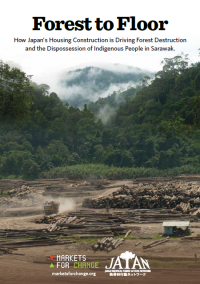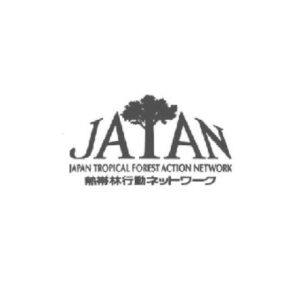Open Letter: Petition Regarding Support for the Reconstruction of Livelihoods of the Displaced Residents of Cawang Gumilir
Five years have already passed since the people of Cawang Gumilir were forcibly evicted from the project area of PT Musi Hutan Persada (hereafter MHP), a Marubeni Group company.
Nevertheless, it has been still difficult to see any substantial improvement concerning the displacement. Many of those who were evicted have ended up leading insecure lives as field workers. There is thus an urgent need to reconstruct the livelihoods of those affected.
Dr. Masatoshi Sasaoka, the international environmental NGOs Friends of the Earth Japan (FoE Japan), Japan Tropical Forest Action Network (JATAN), the Network for Indonesian Democracy Japan (NINDJA) and WALHI South Sumatra submitted an open petition letter to MHP and Marubeni to address the current situation.
---------------------------------------------------------------------------
21 June 2021
Mr. Masumi KAKINOKI,
President and Chief Executive Officer, Marubeni Corporation
Mr. Yasunari NAKABAYASHI,
President Director, PT Musi Hutan Persada
Open Letter: Petition Regarding Support for the Reconstruction of Livelihoods of the Displaced Residents of Cawang Gumilir
Five years have already passed since the people of Cawang Gumilir were forcibly evicted from the project area of PT Musi Hutan Persada (hereafter MHP), a Marubeni Group company.
During this time, we have urged your company to resolve the land conflict between the Cawang Gumilir community and your company. In September 2016, the international environmental NGOs Friends of the Earth Japan (FoE Japan), Japan Tropical Forest Action Network (JATAN), and the Network for Indonesian Democracy Japan (NINDJA) submitted a petition to request guarantees that the basic needs of the people of Cawang Gumilir would be supported until the conflict was finally resolved. At the same time, Junichi Mishiba, Toyoyuki Kawakami, and Akira Harada, the three NGO members listed as the senders of this petition, have been involved in seven meetings with relevant officials from your company, including its CSR and Sustainability divisions, to call for this problem to be addressed.
Subsequently, MHP took some action, including attending a meeting with WALHI Sumatra Selatan, part of the Indonesian Forum for the Environment (WALHI) that supports the displaced community of Cawang Gumilir, and made promises to facilitate discussions with the government. Nevertheless, it is difficult to see any substantial improvement concerning the displacement. Many of those who were evicted have ended up leading insecure lives as field workers. There is thus an urgent need to reconstruct the livelihoods of those affected.
Masatoshi Sasaoka, named as one of the senders of this open letter, has recently authored two papers based on interviews with the displaced and the staff of related government organizations, on your company’s answers to his questionnaire, and on various other documentation regarding the historical formation and forced eviction of Cawang Gumilir (please see attached documents).
As his papers argue, we believe that MHP, and Marubeni as its parent company, must fulfill their social responsibility—beyond their legal responsibility—to ensure the reconstruction of the livelihoods of the evicted from Cawang Gumilir.
First, an unlawful land occupation occurred in Cawang Gumilir in the context of MHP’s management of the deserted concession area. The company failed to define clear boundaries for their “conservation area”, which MHP claimed overlapped with Cawang Gumilir people’s cultivated fields and residence area, and to stop the influx of squatters at an early stage (please see attached documents for details). These failures allowed many people to enter the area and use it to cultivate food and build social infrastructure after many years of hard work. MHP’s forced eviction resulted in greater damage to the community.
Second, the forced eviction contradicts Marubeni’s “Basic Policy on Human Rights”. MHP, which holds a concession from the Indonesian Government, can find ways to solve problems without resorting to compulsory means. However, the company used a very heavy-handed measure to resolve the issue, instead of taking a peaceful approach such as consultation or other alternative ways of settling the case. Moreover, MHP requested the help of the District Forestry Department (Dinas Kehutanan Kabupaten) to force people to leave. According to the International Covenant on Human Rights, forced evictions shall be used as a measure of “last resort” only when it is proven that “squatters” threaten to damage public goods and all necessary measures to avoid eviction have been exhaustively employed. It is difficult to see the compulsory eviction from Cawang Gumilir as a “last resort”.
Third, the forced eviction violated their property rights to their possessions above ground. As described above, “unlawfully” developed fields and housings had not been under MHP’s management for years after people came to settle in the area. The communities in question had invested considerable resources and years of effort in making the land productive and developing their assets. Their rights to crops, buildings, and other improvements to the land should be recognized even if the land itself was acquired in an “unlawful” way. The Cawang Gumilir people have never received adequate compensation for their possessions on the land. We consider this to be a serious human rights violation under international ethical norms.
With the above in mind, we request the following.
1. Please explore the possibility of letting the Cawang Gumilir community return to the Cawang area.
Many in the Cawang Gumilir community are eagerly awaiting a chance to return to the area and settle in harmonious coexistence with wild elephants. We understand that your company sees negatively the idea of their return due to voices in the Ministry of Environment and Forestry (Kementerian Lingkungan Hidup dan Kehutanan: KLHK) arguing that the area designated for conservation should be protected for wild elephants. We are also aware that you are concerned that conflicts between humans and animals would emerge after the people return. However, there is little scientific knowledge on how important the Cawang area is for the conservation of wild elephants. There is also not enough knowledge to judge whether the conflict between elephants and inhabitants is unavoidable. Sasaoka confirmed with officials of the South Sumatra Agency for Conservation of Natural Resources (Balai Konservasi Sumber Daya Alam Sumatera Selatan: BKSDA Sumatera Selatan) that detailed ecological research on seasonal habitat use patterns, food habits, and population trends of the elephants in the area has not yet been conducted. For these reasons, we urge you to consider the possibility that the Cawang Gumilir people may return to the area and rebuild a community that guarantees a peaceful relationship with the elephants, in collaboration with governmental agencies, including KLHK and WALHI Sumatra Selatan, and scientific researchers. We also request you to share the information and knowledge obtained in the process with the relevant parties.
2. Please provide an appropriate alternative site in case it is impossible for people to return to the Cawang area.
If you conclude that it is impossible for people to return to the Cawang area, we urge you to provide an alternative site for their resettlement and to reconstruct their livelihoods through a comprehensive consultation process. In January 2018, MHP proposed an alternative site. However, since this land is part of a dispute between MHP and another local community, the people of Cawang Gumilir are concerned that relocation to the proposed site may cause new conflicts among local communities. In addition, the site in question is often flooded in the rainy season. Therefore, the representatives of the Cawang Gumilir community are opposed to the proposed relocation plan. We demand that you identify a suitable site for resettlement in consultation with the people by considering its long-term consequences not only for the Cawang Gumilir community but also for the one they would move into.
3. Please compensate for the possessions destroyed during the eviction.
In addition to the above, we urge you to compensate people for possessions such as houses, crops, and so on, which were destroyed during the forced eviction. Many of those who migrated to Cawang did not have or had little land where they came from. They made a living by working as day or migrant laborers. Before migrating, they obtained some money by selling what little possessions they had. With that money, they cleared farmland and built houses in Cawang. Their property rights to crops, houses, and other improvements made to the land should be recognized even if the land itself was acquired in an “illegal” way.
4. Please respond in writing regarding the abovementioned requests.
We would like to ask you to let us know your strategies for dealing with the three points above in the future. To begin with, please inform us of when you will be able to give us an answer.
Since your company has a significant influence in the pulp and paper industry, it is strongly expected to fulfill corporate social responsibility. We sincerely hope that Marubeni will take responsible measures regarding the matter of Cawang Gumilir in keeping with its “Basic Policy on Human Rights”.
Hairul Sobri Eep (WALHI Sumatra Selatan, Executive Director)
Mishiba, Junichi (FoE Japan, Executive Director)
Harada, Akira (Japan Tropical Forest Action Network, Director)
Kawakami, Toyoyuki (Japan Tropical Forest Action Network, Steering Committee member)
Nakatsuka, Takayuki (Japan Tropical Forest Action Network, Steering Committee member)
Saeki, Natsuko (Network for Indonesian Democracy, Japan, Secretary-general)
Sasaoka, Masatoshi (Hokkaido University, Associate Professor)
Attached documents:
・Attachment (1)
Sasaoka, M. 2021.” Why did they become ‘illegal squatters? Insights into social responsibility for the life reconstruction of evicted people”,In Sasaoka, M. and Fujiwara, T. eds. Tropical Forest Conservation for Whom? Implications for future tropical forest governance from field research, Shinsensya, pp. 196-219 (in Japanese).
・Attachment (2)
Sasaoka, M. 2020. “Social Responsibility for the Life Reconstruction of Evicted ‘Encroacher’: A Case of Forcible Eviction from the Industrial Tree Plantation in South Sumatra, Indonesia,” Hakusan Review of Anthropology, 23: 73-102 (in Japanese).
---------------------------------------------------------------------------
Download "Open Letter" in PDF
【Reference】
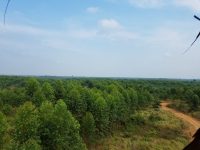
Newly planted acacia in "Conservation Area", ex-Cawang Gulimir community (Photo: March 2019, Taketo Suzuki)
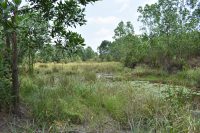
Relocation site proposed by MHP for Cawang Gumilir community (Photo: March 2019 Masatoshi Sasaoka)
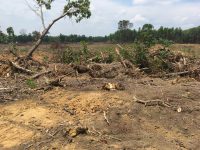
Ex-rubber garden destroyed by MHP, Desa Suban Ulu Semangus, kecamatan Talang Ubi (Photo: March 2019 JATAN)

